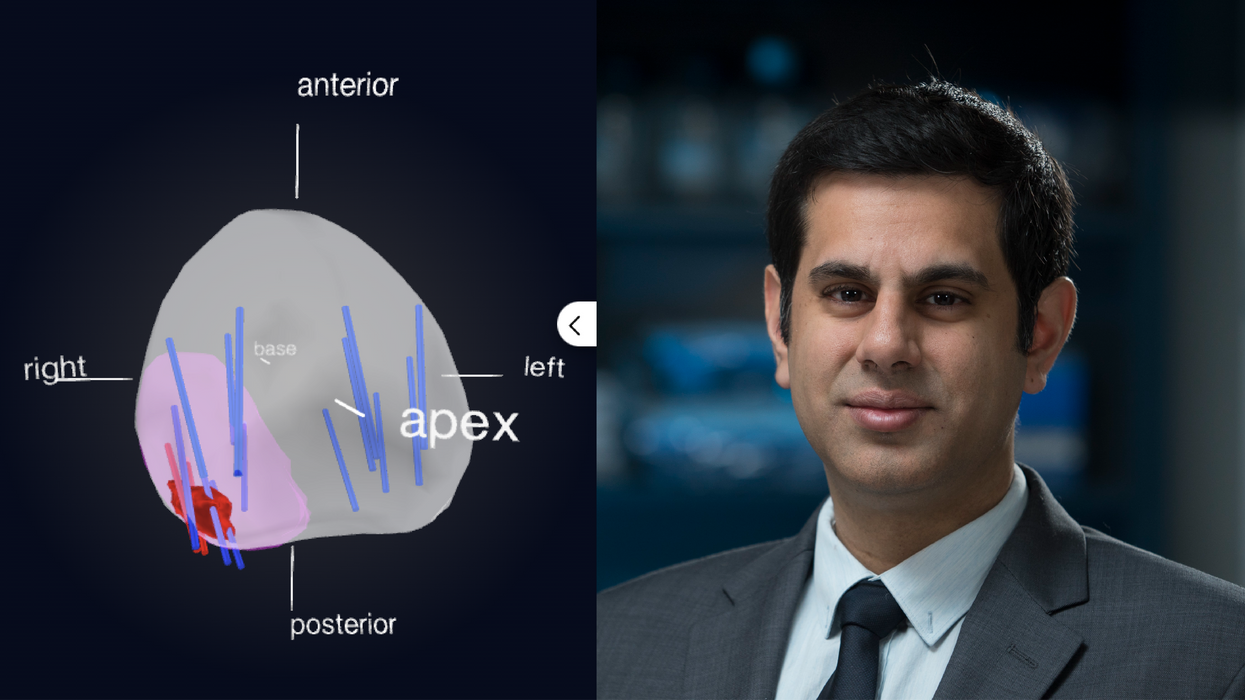How UCLA-Backed Biotech Firm Avenda Health is Using AI to Map Cancer Tumors
Samson Amore is a reporter for dot.LA. He holds a degree in journalism from Emerson College. Send tips or pitches to samsonamore@dot.la and find him on Twitter @Samsonamore.

Last year, the Massachusetts Institute of Technology began testing an artificial intelligence platform called Tempo that used a risk-assessment algorithm to recommend mammogram screenings. By feeding the AI personal health data, including risk factors, existing diagnoses and prior screening information, Tempo was able to recommend to clinicians when to schedule exams for breast cancer.
The algorithm was an early example of the push to use bots to screen for and detect cancers. More recently, Avenda Health, a Culver City-based biotech firm, announced the development of a platform called Unfold AI—a breakthrough device that uses AI to create maps of prostate cancer tumors. The technology works by using machine learning to analyze existing patient health information to create a digital map of where prostate tumors reside, with the goal of using that imaging to better administer life-saving surgeries to patients.
Currently, the mapping is done via MRI. While MRIs do work, Avenda Health co-founder Dr. Shyam Natarajan claimed Unfold AI’s imaging is more comprehensive, adding that with MRIs you can only see “only 39% of finding all the cancer, we’re boosting that to 97%.”
To develop the device, Avenda partnered with Bioscience LA, a nonprofit that was founded by the city of Los Angeles in 2018 to foster growth in the region’s bioscience industries and backed by some of Southern California’s biggest healthcare providers and biopharmaceutical companies including Amgen, Cedars-Sinai and City of Hope.
In addition, the FDA announced a “breakthrough device” designation to allow Avenda to begin testing the products on patients.
Natarajan co-founded Avenda Health in 2017 alongside Dr. Brit Berry-Pusey and Dr. Leonard Marks as a spinout of UCLA. The company has raised $16 million to date, including a grant from the National Cancer Institute and a $10 million Series B last June. Avenda recently announced it will expand its space at the Bioscience LA incubator, with its roughly 18 employees occupying 2,200 square feet in BioscienceLA’s Culver City headquarters.
According to the U.S. Centers for Disease Control and Prevention, prostate cancer is the second most common cancer among men in the U.S. In 2019, the disease affected an estimated 21,769 men in California alone. The problem Avenda is trying to solve in part is that most men don’t get screened for prostate cancer because they either aren’t aware of the need or are concerned about the intrusiveness of getting an exam.
More importantly, Natarajan hopes the device can help with the invasiveness of prostate surgery as well. While it doesn’t perform surgeries, Unfold AI does create detailed imaging of a prostate cancer tumor, which allows surgeons to more specifically pinpoint what to remove.
He likened current prostate cancer treatments to cutting your whole hand off if you noticed a mole on it. “Even though one out of every seven or eight men have a lifetime risk of getting this disease, about 50% or more of men end up losing their quality of life, their sexual and urinary function, and sometimes bowel function as a result of treatments.”
In those cases, removing cancer cells opens the door to a new kind of physical torture. “We do a really good job of screening patients and selecting them for risk of prostate cancer,” said Natarajan. “[But] we have not done a great job of correctly stratifying who's actually going to be benefiting from therapy and who is going to benefit from that preservation of quality of life from a localized treatment that doesn’t need to treat the entire cancer or the entire gland."
Unfold AI won’t prevent prostate cancer, certainly. But, Natarajan added, “It’s a leap forward in how we're able to actually identify patients with prostate cancer and their tumors. To really inform better decisions for therapy and to give a better target for physicians to go and take out the cancer while leaving those critical structures that control quality of life, intact.”
- AI Is Here To Stay in the Health Tech World ›
- Regard Raises $15M for AI-Powered Software That Help Doctors Diagnose Patients ›
- Venture Cash Is Pouring Into AI that Can Diagnose Diseases. Doctors Aren’t Sure They Can Trust It. ›
- How Integrated AI is Quickly Taking Over Health and Wellness - dot.LA ›
Samson Amore is a reporter for dot.LA. He holds a degree in journalism from Emerson College. Send tips or pitches to samsonamore@dot.la and find him on Twitter @Samsonamore.




 Image Source: Tinder
Image Source: Tinder Image Source: Apple
Image Source: Apple